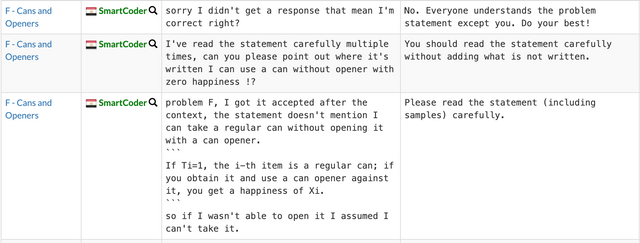I just wonder if it was a common misinterpretation or it's only me, the problem says
If Ti=0, the i-th item is a pull-tab can; if you obtain it, you get a happiness of Xi.
If Ti=1, the i-th item is a regular can; if you obtain it and use a can opener against it, you get a happiness of Xi.
If Ti=2, the i-th item is a can opener; it can be used against at most Xi cans.
for Ti=1, my understanding is I can use it with a can opener, but I don't see anywhere in the statement where it says I can use it with 0 happiness.
Atcoder says I need to carefully read the problem statement and I'm the only one who didn't understand the problem.
I understand I can use any Ti=0, I understand I can use any Ti=2, but it's not clear if Ti=1 I still can use it with 0 happiness.
https://atcoder.jp/contests/abc312/tasks/abc312_f

→ Обратите внимание
До соревнования
Rayan Programming Contest 2024 - Selection (Codeforces Round, Div. 1 + Div. 2)
5 дней
Зарегистрироваться »
Rayan Programming Contest 2024 - Selection (Codeforces Round, Div. 1 + Div. 2)
5 дней
Зарегистрироваться »
*есть доп. регистрация
→ Лидеры (рейтинг)
| № | Пользователь | Рейтинг |
|---|---|---|
| 1 | tourist | 3993 |
| 2 | jiangly | 3743 |
| 3 | orzdevinwang | 3707 |
| 4 | Radewoosh | 3627 |
| 5 | jqdai0815 | 3620 |
| 6 | Benq | 3564 |
| 7 | Kevin114514 | 3443 |
| 8 | ksun48 | 3434 |
| 9 | Rewinding | 3397 |
| 10 | Um_nik | 3396 |
| Страны | Города | Организации | Всё → |
→ Лидеры (вклад)
| № | Пользователь | Вклад |
|---|---|---|
| 1 | cry | 167 |
| 2 | Um_nik | 163 |
| 3 | maomao90 | 162 |
| 3 | atcoder_official | 162 |
| 5 | adamant | 159 |
| 6 | -is-this-fft- | 158 |
| 7 | awoo | 156 |
| 8 | TheScrasse | 154 |
| 9 | Dominater069 | 153 |
| 10 | nor | 152 |
→ Найти пользователя
→ Прямой эфир
↑
↓
Codeforces (c) Copyright 2010-2024 Михаил Мирзаянов
Соревнования по программированию 2.0
Время на сервере: 25.11.2024 19:42:24 (f1).
Десктопная версия, переключиться на мобильную.
При поддержке
Списки пользователей


| Название |
|---|










Yes nowadays problem statements tend to be more difficult to understand. That is a bad trend which should be stopped immediately.
Auto comment: topic has been updated by Killever (previous revision, new revision, compare).
I don't understand your question.
The problem statement says I need to take exactly M items, so let's take an example that will clarify my question.
4 4
0 2
2 1
1 4
1 3
what will be the answer!?
-------------
I say I can't take M items, so the answer will be zero, but they say the answer is 6.
- get the pull-tab can with happiness 2.
- get the opener can so we can open another can.
- get the regular can with happiness 4.
now I got 3 cans, I don't have enough opener cans so I can't get the regular can with happiness 3. but the problem writer says I can get M items, and I can get the last regular can with happiness 0, and I don't see anywhere in the statement says I can do that.
There is no restriction to pick a regular can. You can just pick M cans. But you can get happiness if you obtain and use a can opener against it.
This is exactly the problem, it's not clear in the statement that I can take a regular can without opener, also the examples doesn't clarify that, anyways thanks for your reply.